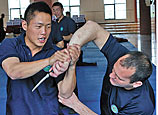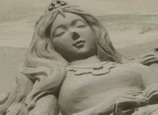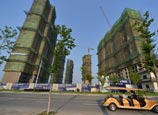
 |
| Lianshi is one of the small river towns along the Grand Canal. (China Daily/Raymond Zhou) |
Also, in those days, there were more activities on the river than on the street. Most boats were rowed by hand. When two boats passed each other, someone would shout "pull the paddle" (banshao) or "push the paddle" (tuishao) and they always miraculously avoided collision, not even a scratch against each other during my years of river watching.
Most boats were used for transporting goods. Occasionally, there was a boat that was essentially a floating abode. The whole family would live on it, with a stove and smoke billowing out during mealtime. I'd always notice a kid, smaller than I was, playing on the stern.
Of course, I envied them for the squeaky clean wooden floor and for the ability to go places. My parents would chide me, saying those boat people were among the poorest. "They don't have even electricity."
I never got to know a single boat family in person. We were townsfolk, guaranteed by the household registration system, and those people had to be peripatetic with no place to call home — except their boat.
There was one family though, a mother and a son around my age, living on the outskirts of the town. They lived in a mud hut, obviously unable to afford a brick house. And they didn't talk to anyone. They were refugees from the north, I heard, and they never fit in. I guess the boat people would be like them if they tried to settle down somewhere.
There used to be bountiful fish in the tributary. One day, someone driving an engine-powered boat speeded by with an electric rod. Soon, dead fish, large and small, popped to the surface.
"What a clever idea to catch fish," people said.
The river turned shallower and dirtier. By the year I got to high school, I could wade across to the other side. Maybe I was growing taller.
When I returned a decade ago, I was astonished to see the tributary banked up and weeds growing rampant in the section I used as my water playground. The houses flanking the river are now the most dilapidated in town, often rented out to out-of-towners scraping by with odd jobs.
To conjure up the sight of my childhood days on the river, I'd have to travel to the next town about half an hour downstream, Wuzhen, which has turned into a tourist hotspot, as it has restored the old landscape to its former beauty.
I never really swam in the Grand Canal — I mean the main waterway. And I've not seen anyone else doing it. Kids would play in the shallow water close to the bank. The water is said to be too swift.
There is a gas station by the river near my parents' home. I would sit there and watch barges go by. They carry stuff like coal and they are quiet, never announcing their presence by blowing horns, maybe because they've lost their luster as the in-vogue way of getting around.
"The highway network is so advanced now. Why do they keep using the river?" I would ask.
"It still makes economic sense," says my father, "and the same is not true of passenger traffic by water".
The barges are bigger and more frequent than those I can recall. They do not travel all the way from Hangzhou to Beijing. Well, the northernmost section of the Grand Canal is dried up like the tributary that runs through my town. But, as long as the canal still wraps around the town where I grew up, I'll have a place to anchor my vessel of recollections.

















 Shocking! Hairy stocking to beat sex harassment
Shocking! Hairy stocking to beat sex harassment


![]()
